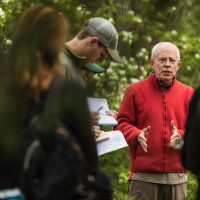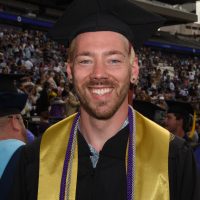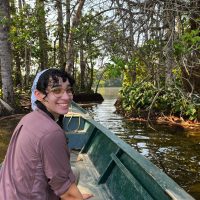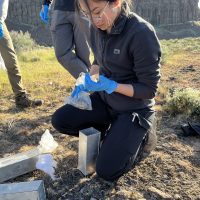The Impact of Giving – A SEFS Donor Spotlight Series: Tom and Arline Hinckley
This is the first donor spotlight in a series. This series of stories reveals the impact that donors have on students, faculty and research here at the School of Environmental and Forest Sciences and more broadly at the College of the Environment.

Emeritus Professor Tom Hinckley and his wife Arline Hinckley are University of Washington alumni. They have been longtime supporters of The College of the Environment, the School of Environmental and Forest Sciences, UW Botanic Gardens, UW Farm and students of the Yakama Nation. Tom’s love of the outdoors, his time spent here at the UW as a student and professor and his approach to hands-on learning in the field inspired him and Arline to establish multiple endowment programs focused on increasing student access to diverse learning opportunities. We sat down with Tom to talk about the motivation to establish such endowments and to better understand the impact that they have had on current students and SEFS alumni.
A passion for the outdoors starts young
As a young boy in south central Pennsylvania Tom Hinckley grew up on a hobby farm surrounded by working farms; for both, he became a helper. Tom and his mother worked a 40-acre hobby farm tending to chickens, canning fresh fruits and vegetables, and turning a run-down hayfield into a healthy grassland. “I sat on the seat of a sickle bar mower towed behind a 1947 Willys Jeep. It was my job to be on the lookout for obstacles while we mowed the hayfield. OSHA wouldn’t have approved,” he jokes. Tom’s love for the outdoors was sparked at a young age and further cultivated by his grandparents who introduced him to hiking in the Canadian Rockies at age 11.
To familiarize yourself with how someone grew up and the nuances of their childhood is to understand the many moments that will go on to shape their adulthood.
Tom’s mom graduated from college in 1936 with a degree in botany; she was determined to go into forestry, but was told women did not go into forestry. She did continue her studies and earned a masters degree in plant taxonomy. She told Tom this story when he was very young – somehow this story had a subtle, but strong impact on him when he decided at the very beginning of his senior year in college to pursue graduate studies in forestry.
A circuitous route to the UW
He began college as a pre-med student. A summer between sophomore and junior years as an orderly in the local hospital convinced him that this was not for him. The next summer, he went to work for the U.S. Fish and Wildlife Service in the Sierras – it was here that he’d experience his first foray into applied biology. Tom loved his experiences working in both the lab and the field with this group of applied scientists. Before he knew it, he applied for graduate programs in forest science. Tom and his girlfriend at the time, now wife, Arline were both admitted to grad school at the UW. An associate dean at the College of Forest Resources played a significant role in Tom’s decision to come to the UW. “David Scott wrote a long letter to me and told me that Washington was unique in that it offered an incomparable diversity of forest types that I wouldn’t be able to find elsewhere,” Tom said. Arline and Tom’s minds were made up. Tom graduated in the spring of ‘71 with a Ph.D. The two of them headed east to Missouri where they spent the better part of a decade before returning to Seattle in 1980 where Tom took a faculty position as an associate professor in the College of Forest Resources.
Soon after he began, Mt. St. Helens erupted and he had his first research project. He and his students and colleagues worked on projects on both sides of the Cascades, from SE Alaska to Venezuela, and from clonal plantations to old growth forests of Douglas-fir and Pacific silver fir. From 1971 to 2014 Tom advised 55 senior theses, 36 master’s, and 26 doctoral students. For his entire teaching career, Tom promoted hands-on, lab- and field-based, immersive, experiential learning. This time spent with students would cement his belief that place-based learning is where the deepest impact on students can be made.
Immersive learning in the field
As a professor at the College of Forest Resources, field experience became integral to Tom’s teaching philosophy. Tom created and led the widely sought after Spring Comes to the Cascades course. What began as an opportunity to get himself and students outdoors became an amazing rich and deep learning about place and time: ‘who is there (an inventory), what’s happening, how did they get there, and what will happen in the future?’ Often Native Americans were in the class, and they would expand the learning experience by sharing their perspective. “I began to realize that there were different ways of knowing about time and place. I also began to be aware of the limitations of my way of knowing about time and place. We all grew from sharing different perspectives,” Tom said.
In 2002, Tom and others responded to an invitation by tribal alums of the College of Forest Resources. An overnight field trip to the Yakama Nation became the first part of a core class and then a stand-alone course entitled “The Role of Culture and Place in Natural Resource Stewardship.” Tom became the caretaker of this course and the relationship with the Yakama Nation. Students were led from steppe-shrub and stream habitats to forests, and mountain meadows that looked out to Pah’to (Mt. Adams) – the place where Yakama tribal members have come for time immemorial to harvest berries and roots. Students were immersed in Yakama Nation culture, history and learned how modern technology braided with the traditional knowledge of the tribe. This experience with the Yakama Nation is still running strong after 22 years. Such approaches to student learning are a core principle of the School of Environmental and Forest Sciences, whether this learning occurs in the Washington Park Arboretum, at the UW Farm, or in Yellowstone National Park. The Hinckley Family Endowed Student-Faculty Support Fund was designed to support students and faculty interested in such field experiences while the Yakama Tribal Student Support Fund was a way to insure reciprocity between the Yakama and the UW.
Student impact
The Hinckley family established the Yakama Tribal Student Support Fund in 2005 and the Hinckley Family Endowed Student-Faculty Support Fund in 2012. “My exposure to students over the last several decades has not only reinforced in me the power of experiential, but it has also humbled me. I quickly noticed that not all students had a lunch or they had inadequate footwear, or no rain gear. I learned from other students that they had friends who would have liked to take either course, but they could not afford the course fee. Still other students did not have access to the course, because they could not afford to skip their job.” “For me access and equity are important issues in experiencing the full breadth of what is available at the University of Washington, Arline and I see these Endowed Funds as one mechanism to assure access and some degree of equity. We look back 60 years when we were just beginning junior year; the level of student poverty was not what it is today.” Since then, some four dozen students have received funds to assist them in dealing with course fees, access to field work, field equipment and travel.
We had the opportunity to speak with SEFS students and talk about how the endowment has lessened the financial pressure in their pursuit of science and learning here at the College of the Environment. These students have shared their experiences to give us insight into the impact of giving on students here at the UW.
 Apollo Normet | Class of 2024 | B.S. Environmental Science and Terrestrial Resource Management with a minor in Climate Science
Apollo Normet | Class of 2024 | B.S. Environmental Science and Terrestrial Resource Management with a minor in Climate Science
“I am so grateful to be a recipient of your endowment. Your continued generosity has allowed me to finish my degree while being able to participate in further immersion, without as much stress of financial hardship. It was great to be able to work and learn from Tom during my trip to Yakama as a part of the Yakama Nation experience class. Thank you again for enabling this opportunity for myself and others, and for your years of service.”
 Lindsey Bartholomew | Class of 2024 | B.S. Environmental Science
Lindsey Bartholomew | Class of 2024 | B.S. Environmental Science
“One of the most impactful experiences I had was participating in a field course at Yellowstone National Park, thanks to the support from this fund. During this trip, I had the incredible opportunity to learn about the park’s wildlife history, attempt to trap ravens, assist in performing a necropsy, and gain insights from experts in the field. These hands-on experiences were invaluable and significantly enhanced my understanding and appreciation of wildlife conservation. I am deeply grateful for the support provided by the Hinckley Family Endowed Student-Faculty Support Fund. This scholarship has not only alleviated financial stress but has also given me the motivation and confidence to continue pursuing my dreams in wildlife conservation. Thank you for your generosity and belief in students like me.”
 Bre Rodriguez | Class of 2025 | B.S. Environmental Science and Terrestrial Resource Management with a minor in Environmental Public Health
Bre Rodriguez | Class of 2025 | B.S. Environmental Science and Terrestrial Resource Management with a minor in Environmental Public Health
“Earning scholarships such as this one helps take the stress away from experiences regarding my passions. As I am very busy and financially pinched, this scholarship allowed me to breathe and fund necessities for my educational progression. Knowing this type of help is available encouraged me to look for more opportunities and financial help.
Thanks to being awarded this scholarship, this award pushed me to strive for a study abroad trip. At the end of last summer, I studied abroad in Costa Rica conducting microbiology research!”
If you’re looking for ways to give to to students working in the field, please consider donating to one of the Hinckley family endowments.
Hinckley Family Endowed Student-Faculty Support Fund
Yakama Nation Endowed Fund for Student Support in the College of the Environment